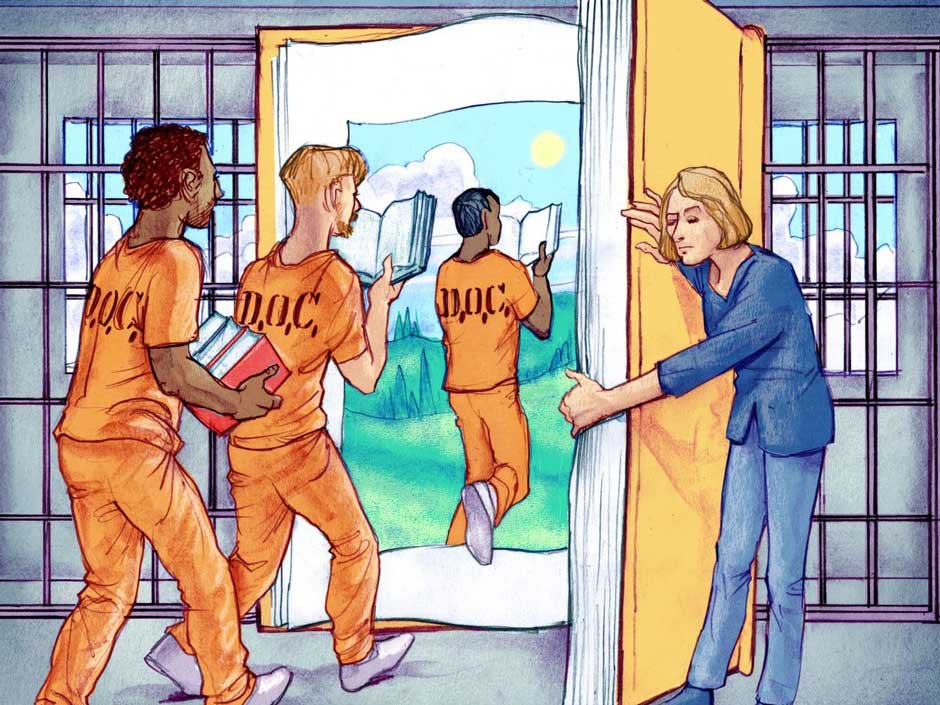In a thought-provoking Wall Street Journal commentary by Brooke Allen titled “College Should Be More Like Prison,” concerns about the state of higher education in the humanities are raised. The declining enrollment in these subjects and the prevalence of students with limited understanding of disciplines like literature and history have become disheartening trends. The advent of technology, including messaging apps, digital crib sheets, and services like ChatGPT that generate essays on demand, has fostered a culture of casual cheating. However, an alternative perspective emerges from an unexpected place: a men’s maximum-security prison. The author shares their experience teaching incarcerated individuals enrolled in a for-credit college program, highlighting the contrasting dedication and work ethic they observe. This article explores the unique aspects of prison education that challenge the shortcomings of modern college education.
The Motivation and Diligence of Incarcerated Students
The students in the prison education program exhibit a level of motivation and hard work that stands in stark contrast to many contemporary undergraduates. They approach their assignments with exceptional diligence, often reading them multiple times and taking thorough notes. Some of these individuals have spent decades behind bars, dedicating their time to reading books. Their extensive knowledge and intellectual curiosity make them formidable participants in any graduate seminar. The challenging life experiences they have faced outside the prison walls contribute to their resilience and make them less susceptible to embracing simplistic ideologies. It is worth noting that a significant proportion of these students are from black and Latino backgrounds. While they may not agree with the ideas on race presented by authors like David Hume or Thomas Jefferson, they still value the opportunity to engage with their works. They actively seek to be part of the ongoing conversation that spans centuries and forms the foundation of our civilization. For these men, the classes offered in prison become the most engaging and fulfilling aspects of their lives, often serving as their sole source of intellectual stimulation.
The Absence of Technological Distractions
One crucial factor that distinguishes prison education from traditional college settings is the absence of cellphones and internet access. This lack of connectivity renders cyber-cheating impossible, safeguarding the integrity of the learning environment. Moreover, it allows incarcerated students to maintain their attention spans, a stark contrast to the diminished focus observed among modern college students, whose reliance on smartphones has eroded their ability to concentrate. In the prison classroom, students engage in uninterrupted 2½-hour sessions without yawning or taking unnecessary breaks, demonstrating an impressive level of concentration and commitment to their education.
Embracing Intellectual Pursuits
The subjects covered in prison education extend far beyond mere academic exercises. Students explore topics ranging from the Enlightenment and the Renaissance to Romanticism, George Orwell, South Asian fiction, and seminal thinkers like Adam Smith and Alexis de Tocqueville. Together, they delve into the works of Montaigne, Rousseau, Keats, Erasmus, Locke, Montesquieu, Wollstonecraft, Byron, Goethe, Petrarch, Rabelais, Saadat Hasan Manto, and Rohinton Mistry. The students approach their studies through the lens of time travel, attempting to comprehend the mores and customs of different historical eras from within. This approach fosters a deep appreciation for the complexities of the past, unlike the prevailing view among university students, who often perceive history as an undifferentiated era of oppressive ignorance. The incarcerated scholars, despite their predominantly liberal political views, bring unique perspectives influenced by their religious backgrounds, enhancing the richness of discussions on authors who might have never anticipated their work being studied by classrooms of atheists.
Rediscovering the Essence of Teaching and Learning
Teaching in the prison environment represents an idealized version of the profession, harkening back to the fundamental principles that underpin the act of imparting knowledge. Freed from the burdensome routines of faculty meetings, administrative tasks, and electronic distractions, instructors in prison classrooms can focus solely on facilitating intellectual growth. The absence of student debt, ideological intolerance, and mandatory “diversity” statements create an atmosphere that fosters open-mindedness and genuine intellectual exchange. This environment stands in contrast to the perceived toxicity that some academics encounter in traditional university settings.
Reflecting on the Potential Lessons
Considering the dedication and focus displayed by incarcerated students, it becomes pertinent to question whether university students and professors can cultivate similar habits and create an environment conducive to genuine learning. The prison education system serves as a potential model for a return to the true essence of education and intellectual exploration. If individuals convicted of serious crimes can maintain focus, set aside political and personal differences, support one another’s academic endeavors, write eloquent essays without technological aids, and refrain from cheating throughout the school year, can we not expect the same from university students? It is essential for educators and institutions to reflect on these observations and consider how they can foster an atmosphere that cultivates the habits of disciplined scholarship and intellectual growth.









